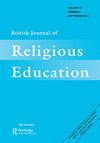通过情感理论的棱镜去殖民化宗教教育:在课程和教学中处理伊斯兰恐惧症的分析视角
IF 0.7
2区 哲学
Q3 EDUCATION & EDUCATIONAL RESEARCH
引用次数: 0
摘要
本文概述了一套基于情感理论的宗教教育非殖民化分析视角。特别是,这些观点是:认识到宗教感情的作用;考察在多大程度上可以在课堂上创造非殖民化的情感空间;以及,理解当代关于多元文化和宗教差异的公共话语是如何被学生和教育工作者在日常生活中深情体验的。有人认为,这些观点有助于进一步揭示当代宗教教育中的殖民遗产,特别是与伊斯兰恐惧症有关的殖民遗产。此外,强调非殖民化宗教教育项目必须关注非殖民化的情感层面;这意味着不仅要质疑殖民主义的情感遗产,如伊斯兰恐惧症,还要在课堂和学校中产生非殖民化的情感社区。本文章由计算机程序翻译,如有差异,请以英文原文为准。
Decolonising religious education through the prism of affect theory: analytical perspectives for approaching Islamophobia in curriculum and pedagogy
ABSTRACT This paper outlines a set of analytical perspectives grounded in affect theory for decolonising religious education. In particular, these perspectives are: recognising the role of religious feelings; examining the extent to which decolonial affective spaces can be created in the classroom; and, understanding how contemporary public discourses about multiculturalism and religious difference are affectively experienced by students and educators in their everyday lives. It is argued that these perspectives contribute to push further the uncovering of colonial legacies within contemporary religious education, especially in relation to Islamophobia. Further, it is emphasised that it is imperative for the project of decolonising religious education to pay attention to the affective dimensions of decolonisation; this implies not only interrogating the affective legacies of coloniality such as Islamophobia, but also producing decolonised affective communities in classrooms and schools.
求助全文
通过发布文献求助,成功后即可免费获取论文全文。
去求助
来源期刊

British Journal of Religious Education
Multiple-
CiteScore
2.60
自引率
12.50%
发文量
33
期刊介绍:
The British Journal of Religious Education (BJRE) is an international peer-reviewed journal which has a pedigree stretching back to 1934 when it began life as Religion in Education. In 1961 the title was changed to Learning for Living, and the present title was adopted in 1978. It is the leading journal in Britain for the dissemination of international research in religion and education and for the scholarly discussion of issues concerning religion and education internationally. The British Journal of Religious Education promotes research which contributes to our understanding of the relationship between religion and education in all phases of formal and non-formal educational settings. BJRE publishes articles which are national, international and transnational in scope from researchers working in any discipline whose work informs debate in religious education. Topics might include religious education policy curriculum and pedagogy, research on religion and young people, or the influence of religion(s) and non-religious worldviews upon the educational process as a whole.
 求助内容:
求助内容: 应助结果提醒方式:
应助结果提醒方式:


